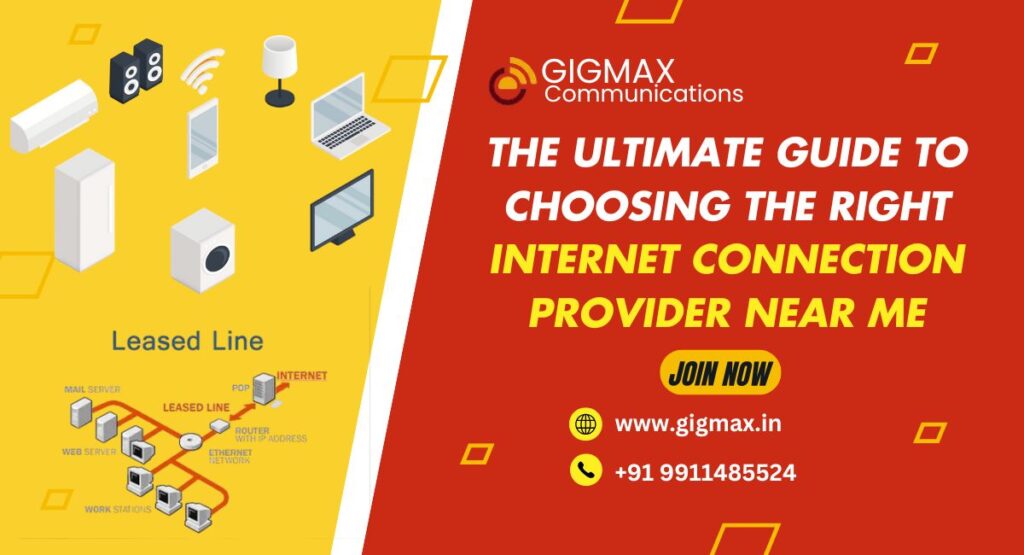
In today’s digital age, having a reliable and fast internet connection is no longer a luxury but a necessity. Whether you are working from home, streaming your favorite shows, or gaming online, choosing the right internet service is crucial for a seamless experience. But with so many providers available, how do you know which is the best for your needs? This ultimate guide will walk you through the key factors to consider when selecting the right internet connection provider.
1. Assess Your Internet Needs–Internet Connection Provider
Before diving into the available options, it’s important to first assess your specific internet requirements. Here are some common categories:
- Basic Browsing and Emailing: If you only need to check emails, browse websites, or handle light online tasks, a lower-speed plan might suffice.
- Streaming and Gaming: For HD streaming, video conferencing, or online gaming, you’ll need a provider offering higher bandwidth and faster speeds.
- Multiple Devices: If your household or office has multiple devices connected simultaneously, you’ll need a plan with high-speed, reliable connectivity to prevent lag.
Once you’ve determined your needs, you can begin your search for the ideal Top broadband provider that offers plans tailored to your specific requirements.
2. Check Availability in Your Area
Not all internet service providers (ISPs) are available everywhere. This means your first step should be to research which ISPs operate in your region. You can easily do this by searching for an internet connection provider online or using comparison websites that allow you to enter your location and filter providers accordingly.
3. Consider Connection Types
Internet service comes in different forms, and each has its own strengths and weaknesses. Here are the most common types of internet connections:
- Fiber: Fiber-optic connections offer the fastest speeds available, often ranging from 100 Mbps to 1 Gbps or more. If fiber is available in your area, it’s an excellent option for high-speed internet.
- Cable: Cable internet uses the same infrastructure as cable TV. While generally fast and widely available, it can slow down during peak hours.
- DSL: A more affordable option, DSL uses telephone lines for internet access. It’s not as fast as fiber or cable but may suffice for light users.
- Satellite: Satellite internet is available in rural areas where other types of connections are not. While it provides decent speed, latency can be an issue for activities like gaming or video calls.
Make sure to check which connection type your Business internet provider offers to ensure you’re getting the right service for your needs.
4. Compare Speeds and Pricing- Internet Connection Provider
Once you’ve narrowed down your list of potential providers, it’s time to compare the speeds and pricing. Look for plans that offer sufficient speed based on your usage. For example, if you stream in 4K or have multiple devices connected, you’ll need at least 100 Mbps or more.
It’s also important to compare pricing between each internet connection provider to get the best value for your money. While some providers may offer lower prices, make sure you’re not sacrificing speed or reliability for cost savings.
5. Look for Customer Support and Reliability
A fast connection is meaningless if it’s frequently down or if you can’t get help when needed. Customer service and reliability are critical factors in choosing an internet provider. Read reviews and testimonials from current or past customers to gauge how responsive the internet connection provider is when issues arise. Good customer service can make a huge difference in how satisfied you are with your internet connection.
6. Consider Bundling Options
Many ISPs offer bundled services, such as internet, TV, and phone. These bundles can save you money and provide added convenience if you’re looking for multiple services. However, be sure to compare the pricing of standalone services to ensure the bundle is actually a better deal.
7. Understand Contract Terms and Installation Costs
Before signing up with any High-speed internet connection, carefully review the contract terms. Many providers may require you to sign a one- or two-year contract, and early termination fees can be steep if you cancel before the contract ends. Additionally, check if there are any installation or equipment rental fees, as these can increase the overall cost of your service.
Conclusion
Choosing the right internet connection provider near me doesn’t have to be overwhelming. By assessing your internet needs, checking provider availability, understanding the types of connections, comparing speeds and pricing, and considering factors like customer service and bundling, you’ll be well-equipped to make an informed decision. With the right ISP, you can enjoy a seamless, high-speed internet experience that meets all your online needs.



Leave a Reply